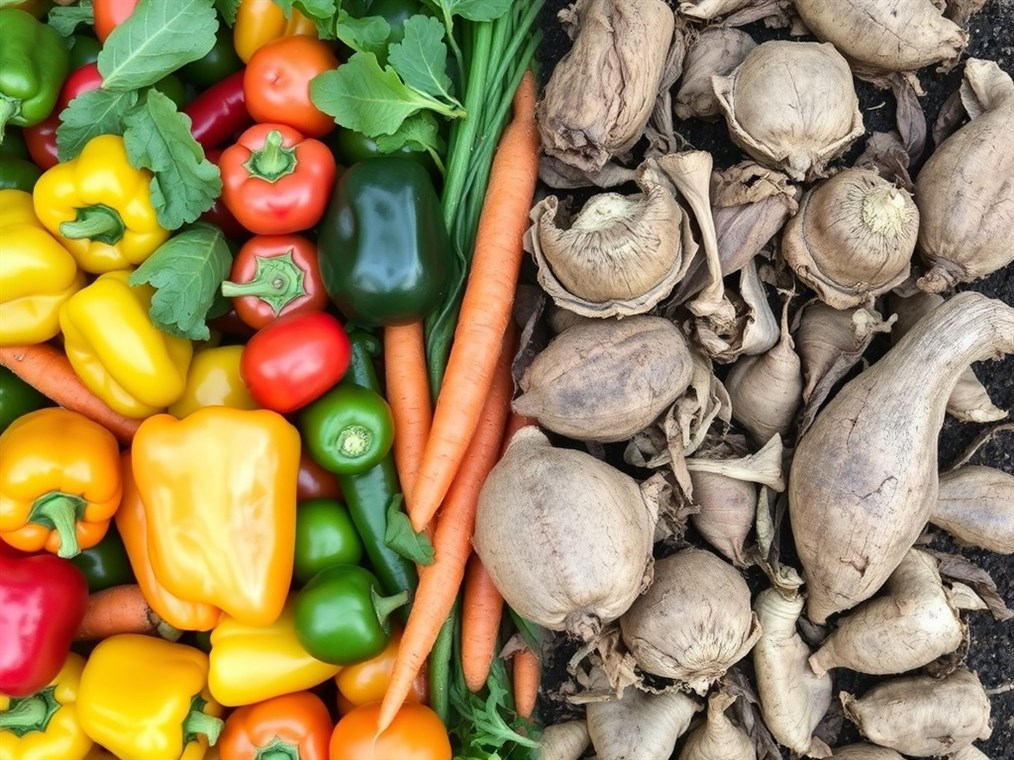So, Your Veggies Are Turning to Mush? Let’s Talk Decomposition
Okay, let’s face it: we’ve all been there. You reach into the crisper drawer, hoping for a crisp bell pepper or a crunchy carrot, and…bleh. Instead, you find a slimy, sad excuse for a vegetable. Decomposition happens. It’s not a matter of if, but when and how fast. Think of it this way: it’s nature’s way of recycling, breaking down the complex stuff into simpler bits and returning it to the earth. For our veggies, that means going from vibrant and nutritious to, well, compost.
The Nitty-Gritty: What Makes Veggies Rot?
Decomposition is more than just “going bad.” It’s a whole chemical and biological dance party. Several factors are at play, all working together (or against each other, depending on how you look at it) to break down your produce.
- The Microbe Crew: Bacteria and fungi are the main culprits. They’re everywhere—in the soil, in the air, even hanging out on the veggies themselves. These tiny guys secrete enzymes, which are like little molecular scissors, chopping up the carbs, proteins, and fats in the plant tissue. Erwinia carotovora? Botrytis cinerea? Yeah, they’re part of the team.
- Enzymes Gone Wild: Even after you’ve picked a vegetable, its own enzymes are still kicking. They can cause some unwanted changes, like that brown tinge you see on cut apples or the mushy texture of overripe tomatoes.
- The Environment Matters: Temperature, moisture, and even how much air and light there is all play a huge role. Hotter temps? Microbes grow faster. Too much moisture? Mold loves it. Not enough? Things dry out. It’s a balancing act.
From Fresh to Fuzzy: The Decomposition Timeline
While every veggie has its own journey, there’s a general pattern to how they break down. It’s kind of like a sad little story in five acts:
- The Glory Days: Fresh, vibrant, full of life. This is the veggie at its peak.
- The Softening: Things start to get a little…limp. Moisture escapes, and the veggie loses its snap.
- The Color Shift: Maybe it’s browning, maybe it’s fading, but the color definitely changes.
- The Stink: Uh oh. Microbes are having a party, and they’re leaving behind some pretty nasty smells.
- The End: Total collapse. Mush, slime, maybe some fuzzy mold. Time for the compost bin.
How Long Will My Veggies Last?
That’s the million-dollar question, right? It all depends.
- Veggie Variety: Some veggies are built to last. Think potatoes, onions, and carrots. Others, like leafy greens, are delicate little snowflakes.
- Storage Savvy: Keep things cool, control the humidity, and you’ll buy yourself some time.
- Handle with Care: Bruises and cuts? That’s an open invitation for microbes.
- Ripeness Roulette: Perfectly ripe veggies are delicious, but they won’t last as long as ones picked a little early.
Pro Tips for Longer-Lasting Veggies
Okay, so you can’t stop decomposition, but you can slow it down. Here are a few tricks I’ve learned over the years:
- Chill Out: Refrigerate your veggies! It’s the easiest way to slow down the bad guys.
- Bag It Right: Perforated bags are your friend. They let veggies breathe without getting too soggy.
- Wash Wisely: Don’t wash veggies until you’re ready to use them. Extra moisture is a no-no.
- Ethylene Awareness: Some fruits and veggies release ethylene gas, which speeds up ripening (and spoilage). Keep ethylene-sensitive veggies (like lettuce) away from ethylene producers (like bananas and tomatoes).
- Use It or Lose It: Seriously, the sooner you eat them, the better they’ll be.
From Rot to Riches: Composting Your Veggie Scraps
Decomposition isn’t just about waste; it’s about renewal. Those decomposing veggies can become black gold for your garden!
- Composting 101: It’s basically helping nature along, creating the perfect environment for decomposition. Mix “green” stuff (veggie scraps) with “brown” stuff (leaves, twigs).
- Compost Perks: Amazing soil, happy plants, and fewer chemicals. Plus, you’re reducing waste!
- Compost Dos and Don’ts: Most raw fruits and veggies are fair game. But skip diseased plants, go easy on the citrus and onions if you’re worm composting, and avoid anything cooked with oils or sauces.
The Bottom Line
Decomposition is a fact of life, especially when it comes to vegetables. But by understanding the process and taking a few simple steps, you can keep your veggies fresher longer, reduce waste, and even create some amazing compost for your garden. Happy eating!

